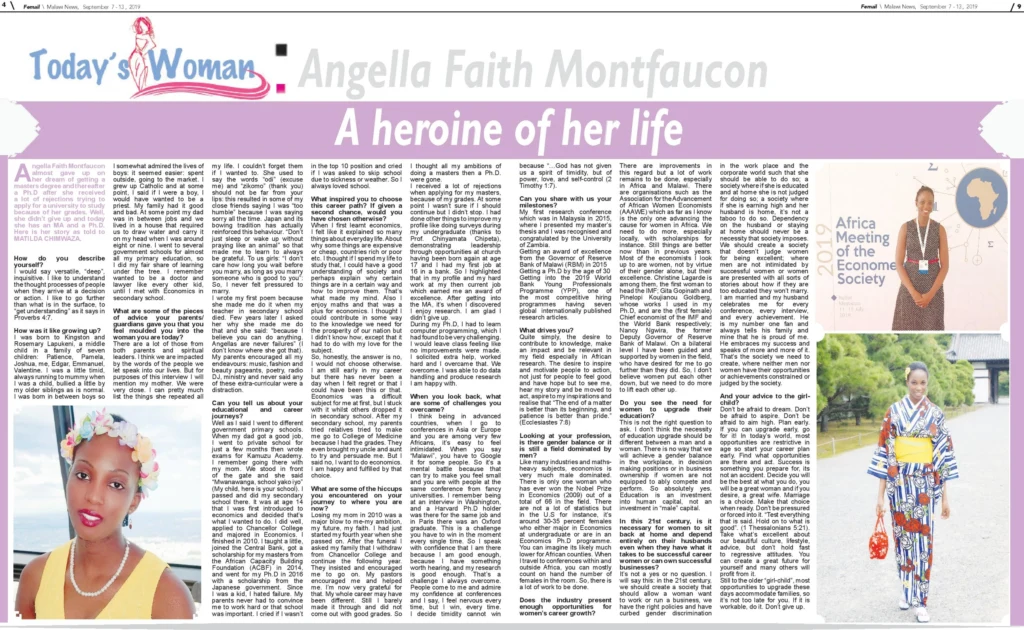In the week of September 7th -13th 2019 I was featured in the Femail column of the Sunday Times newspaper of The Times Group Malawi. The interview was very long and was conducted by journalist Matilda SRJ Chimwaza. It covered various aspects of my life, including my milestones, what drives me, and challenges I have faced and overcome along my career journey. The second half of the interview focused on gender-related issues and I want to highlight some of those thoughts in this blog and share them with you as we commemorate International Women’s Day.
Is there gender balance in your profession or it is still a field dominated by men?
Like many other industries, economics is very much male-dominated. The gender problem in economics has been well documented in several articles by The Economists. Until 2019, there had only been one woman who had ever won the Nobel Prize in Economics (2009) out of a total of 66 in the field. There are not a lot of statistics but in the U.S for instance, it’s around 30-35 percent of females either major in Economics at undergraduate or are in an Economics Ph.D. program. You can imagine it’s likely much lower for African countries. When I travel to conferences within and outside Africa, you can mostly count on one hand the number of females in the room.
There are improvements in this regard but a lot of work remains to be done, especially in Africa and Malawi. There are organizations such as the Association for the Advancement of African Women Economists (AAAWE) of which I am a member, which as far as I know is one of the few advancing the cause for women Economists in Africa. We need to do more, especially locally, with scholarships for instance. Still, things are better now than in previous years. Most of the economists I look up to are women, not by virtue of their gender alone, but their excellence. Christine Lagarde is among them, the first woman to head the IMF; Gita Gopinath and Pinelopi Koujianou Goldberg, whose works I used in my Ph.D., and are the (first female) Chief economist of the IMF and the World Bank respectively; Naomi Ngwira, the former Deputy Governor of Reserve Bank of Malawi. On a bilateral level, I have been guided and supported by women in the field, including my former boss Mercy Kumbatira. So, not all women put each other down, but we need to do more to lift each other up.
Do you see the need for women to upgrade their education?
This is not the right question to ask. I don’t think the necessity of education upgrade should be different between a man and a woman. However, there is no way that we will achieve a gender balance in the workplace, in decision-making positions, or in business ownership if women are not equipped to ably compete and perform. So absolutely yes. Education is an investment into human capital, not an investment in “male” capital.
In this 21st century, is it necessary for women to sit back at home and depend entirely on their husbands even when they have what it takes to be successful career women or can own successful businesses?
It’s not a yes or no question. I will say this: in the 21st century, we should create a society that should allow a woman want to work or run a business, and have the right policies that curb gender discrimination in the workplace and the corporate world such that she should be able to do so. A society where if she is educated and for whatever reason chooses to stay at home, she is not judged for doing so; a society where if she is earning high and her husband is home, it’s not taboo to do so. Dependency on the husband or staying at home should never be a necessity that society imposes or a result of the inability to earn on their own. We should create a society that doesn’t judge women for being excellent; where men are not intimidated by successful women or women are presented with all sorts of stories about how if they are too educated they won’t marry. I am married and my husband celebrates me for every conference, every interview, and every achievement. He is my number one fan and always says that he is proud of me. He embraces my success. That’s the society we need to create, where neither men nor women have their opportunities or achievements constrained but rather harnessed and celebrated.
And your advice to the girl child?
Don’t be afraid to dream. Don’t be afraid to aspire. Don’t be afraid to aim high. Plan early. If you can upgrade early, go for it! In today’s world, most opportunities are restrictive in age so start your career plan early. Find what opportunities are there and act. Success is something you prepare for, it’s not an accident. Take the time to find information from other people, online, blogs such as this one. Decide you will be the best at what you do, you will be a great woman and if you desire, a great wife and mother. Marriage is a choice. Make that choice when ready. Don’t be pressured or forced into it. “Test everything that is said. Hold on to what is good” (1 Thessalonians 5:21). Take what’s excellent about our beautiful culture, lifestyle, advice, but don’t hold fast to regressive attitudes. You can create a great future for yourself and many others will profit from it. Still to the older “girl-child”, most opportunities to upgrade these days accommodate families, so it’s not too late for you. If it is workable, do it. Don’t give up.
You can read the full interview here.

Happy International Women’s Day!